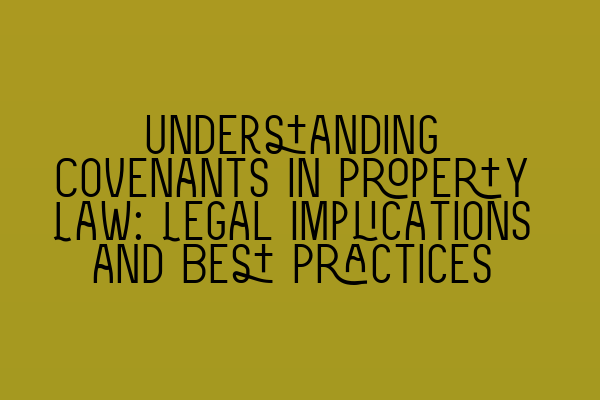Understanding Covenants in Property Law: Legal Implications and Best Practices
In property law, there are various legal concepts and terms that are essential to understand in order to navigate the complexities of real estate transactions. One such concept is covenants, which play a crucial role in governing the rights and obligations associated with a particular property. In this blog post, we will delve into the legal implications and best practices surrounding covenants in property law, helping you gain a deeper understanding of their significance.
What are Covenants?
Covenants are legally enforceable agreements or promises that are binding on the parties involved in a real estate transaction. They are typically incorporated into the property deed and are designed to regulate the use, maintenance, and restrictions imposed on the property. Covenants serve as a means of protecting the rights and interests of property owners and ensuring the orderly development and use of land.
Types of Covenants
There are two main types of covenants: positive covenants and restrictive covenants.
Positive covenants require the property owner to perform certain actions or obligations. For example, a positive covenant may require the property owner to maintain the garden or contribute to the upkeep of shared facilities in a housing development. These covenants aim to ensure the proper maintenance and functioning of the property.
Restrictive covenants, on the other hand, restrict the use or activities that can take place on the property. These covenants may prohibit specific actions such as building structures over a certain height, operating certain businesses on the property, or keeping certain animals. Restrictive covenants are put in place to preserve the character and value of the property and the surrounding area.
Legal Implications of Covenants
Covenants create legal obligations that can be enforced by the parties involved, and in some cases, by third parties. The enforcement of covenants can be done through legal action, which may result in damages or injunctions. It’s important to note that covenants run with the land, meaning that they will bind subsequent owners of the property. This ensures that the obligations and restrictions remain in place even when the property changes hands.
Best Practices for Dealing with Covenants
When dealing with covenants in a property transaction, it is important to follow these best practices:
1. Review and Understand the Covenants: Before entering into any property transaction, conduct a thorough review of the covenants attached to the property. Understand the scope and implications of each covenant to ensure compliance.
2. Seek Legal Advice: Consult with a qualified property lawyer who specializes in covenants to ensure that you fully understand the legal implications and potential risks associated with the covenants.
3. Conduct Due Diligence: Conduct a thorough due diligence on the property to identify any potential issues or breaches of existing covenants. This will help you assess the risks and make an informed decision.
4. Include Covenant Clauses in Property Contracts: When buying or selling a property, include specific clauses in the contract that address the covenants. These clauses should clearly outline the obligations and restrictions associated with the property.
5. Obtain Consent for Modifications: If you wish to modify or vary a covenant, seek the necessary consents from the parties involved. This may require negotiations or applications to the appropriate authorities.
6. Keep Records: Maintain detailed records of all covenant-related transactions and communications. This will help protect your interests and provide evidence in case of disputes or legal action.
In conclusion, understanding covenants in property law is crucial for all parties involved in real estate transactions. By familiarizing yourself with the legal implications and best practices surrounding covenants, you can ensure compliance, protect your interests, and navigate the complexities of property ownership more effectively.
For further resources on preparing for SQE exams, check out our related articles:
– SQE 1 Practice Exam Questions
– SQE 1 Practice Mocks FLK1 FLK2
– SQE 2 Preparation Courses
– SQE 1 Preparation Courses
– SRA SQE Exam Dates
Remember, when it comes to property law, seeking professional advice from an experienced property lawyer is always recommended. They can provide tailored advice and guidance specific to your unique circumstances.
